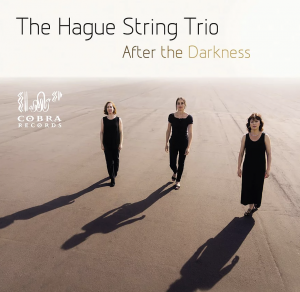 In een verbluffend muzikaal exposé speelt The Hague String Trio op hun nieuwe CD ‘After the Darkness’ muziek van componisten wiens muziek niet werd gewaardeerd en zelfs werd verboden door de Nazi’s. Muziek gecomponeerd voor viool, altviool en cello door Hans Krasá, Gideon Klein, Låzló Weiner, Dick Kattenburg en Mieczyslaw Weinberg.
In een verbluffend muzikaal exposé speelt The Hague String Trio op hun nieuwe CD ‘After the Darkness’ muziek van componisten wiens muziek niet werd gewaardeerd en zelfs werd verboden door de Nazi’s. Muziek gecomponeerd voor viool, altviool en cello door Hans Krasá, Gideon Klein, Låzló Weiner, Dick Kattenburg en Mieczyslaw Weinberg.
English version below
Wellicht is het de kennis dat het hier gaat om componisten die werden vermoord tijdens de IIde Wereld Oorlog (op Mieczyslaw Weinberg na), maar deze muziek heeft een weergaloze diepgang en snijdt zo nu dan dwars door de ziel. Wie daarnaast ooit het concentratiekamp Theresienstadt (Terezin nabij Praag) heeft bezocht waar Hans Krasa en Gideon Klein werden omgebracht, voelt de wreedheden die worden weerspiegeld in deze schitterende stukken. In het openingswerk ‘Passacaglia & Fuga’ (met een link naar Verklärte Nacht van Schönberg) zet The Hague String Trio de toon voor de hele CD. Het trio klinkt als een volledig orkest dat fantastisch op elkaar is ingespeeld. Gedurfd, ingetogen, gewaagd en met een elegante bravoure spelen zij de muziek van vijf Joodse componisten. Zoals Hans Krasa’s ‘Tanec’ (Dans) dat een schitterend intro heeft waar de cellotonen (tremolo) en de liggende alt-viool-klank fraai contrasteren tegen het springerige viool-thema, gevolgd door een melodramatisch B-gedeelte. Innemende timbre’s die elkaar fraai afwisselen. Het ‘Allegro’ van Gideon Klein klinkt (door gebruik van de hele-toonstoonladder) als een impressionistische dans met Moravische volksinvloeden. Deze volksinvloed is ook te horen in het langzame 2de deel ‘Variations on a Moravian folk song’ uit zijn String Trio. De ‘Serenade’ van de Hongaarse componist Låzló Weiner heeft een hoog melodisch karakter. Weiner had les van de Zoltan Kodaly (componist van o.a. de schitterende Háry János Suite) en werd beïnvloed door diens melodische expressiviteit. Dick Kattenburg is de enige Nederlandse componist die op ‘After the Darkness’ te horen is met het stuk ‘Trio a cordes’. Een levendig werk dat opvalt door fraaie chromatiek en een licht neo-romantische inslag. Het werk is een wereldprimeur-opname en verschijnt voor het eerst op CD. Mieczyslaw Weinberg die, mede dankzij Dmitri Sjostakovitsj een groot componist is geworden en o.a de bloedstollende opera ‘The Passenger’ componeerde, overleed in Moskou in 1996. Van hem horen we het ‘Strijktrio Op. 48’. Zijn muziek zit vol onvoorspelbare chromatiek, markante klank-passage’s, gelaagde instrumentatie en een Klezmer-knipoog in het 3de deel ‘Moderato assai’. ‘After the Darkness’ is een schitterend album, waar violiste Justyna Briefjes, altvioliste Julia Dinerstein en celliste Miriam Kirby van het The Hague String Trio de zwarte-2de-W.O.-bladzijde transformeren tot fabelachtige muziek die ze met zeel veel verve uitvoeren!
Zie ook muziek van Ernest Bloch, vioolsonates van Mieczyslaw Weinberg of orkestwerken van Mieczyslaw Weinberg.
————————————————————————————————-
English version
In a stunning musical exposé, The Hague String Trio plays music on their new CD ‘After the Darkness’ by composers whose music was not appreciated and even banned by the Nazis. Music composed for violin, viola and cello by Hans Krasá, Gideon Klein, Låzló Weiner, Dick Kattenburg and Mieczyslaw Weinberg.
More Jewish music, try Ernest Bloch, the violin sonates by Mieczyslaw Weinberg or orchestral works by Mieczyslaw Weinberg.
Perhaps it is the knowledge that this concerns composers who were murdered during the Second World War (except for Mieczyslaw Weinberg), but this music has an unparalleled depth and touches the heart of the music. Anyone who has ever visited the Theresienstadt concentration camp (Terezin near Prague) where Hans Krasa and Gideon Klein were killed, feels the atrocities reflected in these beautiful pieces. In the opening work ‘Passacaglia & Fuga’ (with a link to Schönberg’s ‘Verklärte Nacht’), The Hague String Trio sets the tone for the entire CD. The trio sounds like a full orchestra that is fantastic in their interplay. Brave, modest, adventurous and with a certain bravado, they play the music of five Jewish composers. Such as Hans Krasa’s ‘Tanec’ (Dance) with a wonderful intro where the cello tones (tremolo) and the one-tone alto-violin contrast beautifully to the jumpy violin theme, followed by a melodramatic B section. Captivating timbre’s that alternate beautifully. The ‘Allegro’ by Gideon Klein sounds (by using the full-tone scale) as an impressionistic dance with Moravian folk influences. This folk influence can also be heard in the slow 2nd part ‘Variations on a Moravian folk song’ from his String Trio. The ‘Serenade’ by the Hungarian composer Låzló Weiner has a highly melodic character. Weiner was taught by the Zoltan Kodaly (composer of the beautiful ‘Háry János Suite’, among others) and was influenced by his melodic expressiveness. Dick Kattenburg is the only Dutch composer who can be heard on ‘After the Darkness’ with the piece ‘Trio a cordes’, a world premiere on CD! A lively work that stands out with its beautiful chromaticism and a slightly neo-romantic feel. Mieczyslaw Weinberg, who became on behalf of Dmitri Shostakovich a great composer and composed the great opera ‘The Passenger’, died in Moscow 1996. He composed the ‘String Trio Op.48’. His music is full of unpredictable chromaticism, striking sound passages, layered instrumentation and a Klezmer touch in the third part “Moderato assai”. ‘After the Darkness’ is a beautiful album, where violinist Justyna Briefjes, viola player Julia Dinerstein and cellist Miriam Kirby of The Hague String Trio transform the black-2nd-W.O.-history into fabulous music which they perform with great verve!
- The Hague String Trio: ‘After the Darkness’ (Cobra Records)
© Mattie Poels.

Geen reacties